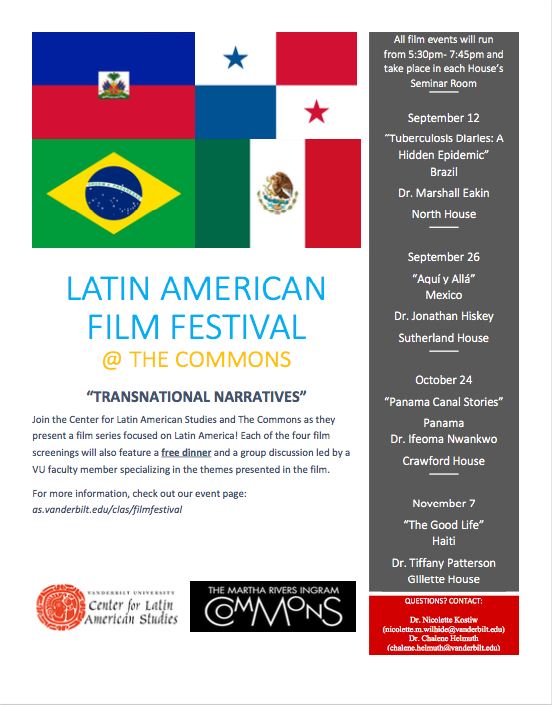Films, food and cultural exploration. Rarely do these three elements come into perfect harmony as they did at the first showing of Vanderbilt’s Latin American Film Festival on Sept. 12 in North House. The festival will host three more showings throughout the semester in three different Commons houses. Each showing includes a free dinner inspired by the particular Latin American nation represented in that night’s film and a discussion led by a faculty expert in an area represented in the film.
Dr. Nicolette Kostiw and Dr. Chalene Helmuth, representing the Center for Latin American Studies and the Department of Spanish and Portuguese, respectively, began the film series last year in the hopes of providing first-year students an interactive way to introduce themselves to one of the many unique resources that Vanderbilt offers.
“We were guided by the principle that first-year students come here expecting to see the world, and this is a great way to bring the world to our campus,” said Helmuth.
In addition to its success in attracting first-year students to one of the unique offerings from the Center for Latin American Studies, last year’s festival also succeeded in providing an avenue for otherwise unlikely campus interactions, which was a major source of inspiration for the renewal of the event this year.
“Looking at the sign-in sheet last year, we had people who were neuroscience majors, biology and earth and environmental sciences, as well as the traditional history and anthropology and languages,” said Kostiw.
This week’s showing of Tuberculosis Diaries: A Hidden Epidemic, which documents the influence of tuberculosis on various communities in Brazil, was especially significant, because it coincided with both the campus’ Brazil Week and one of Vanderbilt’s ongoing Trans-Institutional Programs (TIPs): “A Multi-disciplinary Approach to Assessing Healthcare in Brazil.” In fact, the university originally acquired the film due to the desire of Dr. Marshall Eakin, the lead faculty of the TIP about Brazilian healthcare, to use it for research.
One of the central reasons why the film compelled the festival’s organizers was that it reflected the interdisciplinary nature that Kostiw recognized as an inspiration for the renewal of the series. Not only did the showing of Tuberculosis Diaries: A Hidden Epidemic introduce students to the impact of a disease that is relatively underappreciated in the United States, but it also provided a lens into the life of an inhabitant of a Brazilian flavela, or shantytown, and the Brazilian public healthcare system, which very much contrasts that of the United States.
“The idea of showing this film is that it would also attract people who are interested in healthcare, who don’t know anything about healthcare, or people who know about Brazil but don’t know anything about healthcare,” said Eakin, who was also the faculty discussion leader for the showing.
As the title of the film suggests, a point of emphasis in Tuberculosis Diaries: A Hidden Epidemic was the importance of citizens who showed symptoms of tuberculosis to approach healthcare officials so as to prevent them from unknowingly spreading the disease any further. Much of the responsibility of making sure that citizens communicated their conditions fell on local community agents. These agents worked for one of the numerous public community clinics located in the flavela of Rocinha in Rio de Janeiro. Each of these clinics serves exclusively a small community of people, and most often, community agents are members of these communities themselves, which makes them more approachable for citizens. Despite the praise that the Brazilian healthcare system receives in the film, many Brazilians regard the healthcare system as the nation’s most serious flaw.
“Why is it that all these people have access to this, but everyone seems unhappy?” said Eakin.
This irony not only drove the post-film discussion on Wednesday, but it also inspired the TIP that Eakin leads and past courses on Brazilian healthcare that have been taught in a range of disciplines, from the Political Science and History departments of the College of Arts and Sciences to the Vanderbilt Medical School.
In addition to the unique opportunities of watching cultural movies and having intellectual conversations about international issues, the Latin American Film Festival also distinguishes itself in its offering of authentic Latin American food. Wednesday’s dinner included the Brazilian dishes of feijoada, which is essentially a Brazilian black bean stew, pão de queijo—or Brazilian cheese bread—and steak.
The next showing in the festival will be on Sept. 26 in Sutherland House and will feature the film Aquí y Allá. The movie is about a Mexican immigrant who after years of trying to make money for his family in the United States, returns home to Mexico and struggles with his changed lifestyle. As always, all students, faculty and other members of the Vanderbilt community are invited to attend.
Graphic provided by Chalene Helmuth



